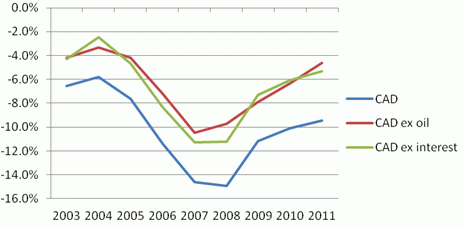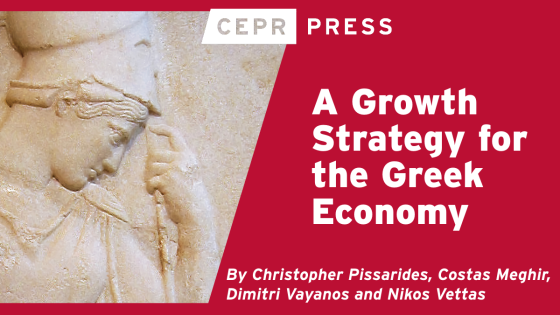Greece has just concluded an agreement with the EU and the IMF on a second rescue package and a write-down of the debt due to private bondholders. The country is in deep recession for the fifth year running and the new package will bring more austerity. Faced with this grim outlook, several prominent observers, including Martin Feldstein (2011), Ken Rogoff, and Nouriel Roubini, have been calling on Greece to exit the Eurozone.
But a return to the drachma would be all pain, no gain (Eichengreen 2007). Exiting the Eurozone would only add to the debt burden without resolving Greece’s competitiveness problem, which stems primarily from regulatory barriers to competition, restrictive labour practices, and red tape that raise the cost of doing business. Greece ranks 100th in the World Bank’s “Doing Business” report and 119th in the Heritage Foundation’s Index of Economic Freedom, behind several sub-Saharan countries. Staying in the Eurozone, on the other hand, raises the question of whether Greece’s post-Soviet economy can deflate itself back to competitiveness. The answer is probably not, because real rigidities prevent the adjustment process from working. What Greece needs is what the IMF calls “growth-oriented structural reforms” – greater reliance on market forces and the rule of law.
Greece is the most highly regulated economy in the OECD. Profit margins or minimum remuneration is set by law in a number of professions (lawyers, engineers, accountants, pharmacists), and licensing requirements impose barriers to entry in others (trucking). It costs less to transport agricultural products from Central America to Greece by ship than it costs to transport them within Greece by truck. Labour contracts set wages on automatic pilot due to seniority clauses and other benefits unrelated to productivity, profitability, or performance. No amount of devaluation will get rid of these distortions.
Appropriately, the new IMF/EU-funded programme includes broad-based structural reforms intended to introduce flexibility in labour markets and intensify competition in goods and services markets. In fact, the new Greek programme reads like a blueprint for reforming a post–Soviet bloc country circa 1990. It includes privatisation, administrative reform, labour and product market reform, and it provides for bank recapitalisation to ensure that the debt restructuring will not destabilise the banking system. While all this is positive for medium-term competitiveness and growth, it also means that the reform process will be protracted and politically difficult.
It took a long time for Greece to get into this mess and it will take a long time to get out of it. Joining the Eurozone in 2001 created the misconception that Greece’s standard of living could converge to the Eurozone average in one giant leap through a debt-financed consumer boom and increases in real wages not matched by productivity improvements. The elimination of exchange-rate risk reduced interest rates to historically low levels, while markets forgot about credit risk. The “Euro dividend” that slashed interest costs in the run-up to the monetary union was not used to pay for structural reform by compensating the losers. Inflation remained persistently above the Eurozone average and resources moved from the internationally competitive sectors, which are price-takers, to the increasingly lucrative sheltered sectors, such as construction and retail trade. As a result, the current-account deficit reached €26 billion in 2009 (11% of GDP) and narrowed only marginally to €21 billion (9.7% of GDP) in 2011 (Figure 1).
Figure 1. Greece’s current-account balance, 2003–11
Having lost access to capital markets since the spring of 2010, Greece is now borrowing from its Eurozone partners and the IMF to cover the gap between consumption and production. The EU/IMF-funded programme permits a soft landing through a mix of adjustment and financing, including the write-down of debt due to private bondholders that will significantly reduce the interest burden. Without the programme, there would be a hard landing to a lower level of consumption due to lack of financing to buy petroleum, medicines, and foodstuffs from abroad. Unilateral default, which some observers advocate, will not solve the problem because interest payments abroad account for just €12 billion out of the €21 billion current-account deficit. Nor would a return to the drachma alleviate the shortage of foreign exchange needed to maintain the current level of imports. Some form of rationing of essential imports would need to be imposed, as well as a freeze on bank deposits to avoid a run on the banks.
The point is that Greece’s real income and wealth will fall sharply in any case, regardless of whether Greece exits the Eurozone or not, as Nouriel Roubini (2011) concedes. The choice is between negative growth with inflation or negative growth without inflation. In my view, returning to a devalued drachma will not help Greece’s economy recover faster from the deep recession. Greece will still be the most heavily regulated country in the OECD, while its competitiveness ranking would probably slip further due to the inevitable restrictions on imports and bank deposits. Looking back to the drachma period before 2001, there was a recurrence of currency crises resolved through devaluations that did not improve competitiveness on a lasting basis.
No country has ever devalued its way to prosperity. Imbalances and distortions that have to do with the real economy cannot be addressed through monetary tools. The bloated protected, non-traded goods sector not just in Greece but in all Southern European economies does not constitute a flaw in the functioning of the monetary union, but a flaw in the functioning of markets, which can only be addressed through structural reform, not through monetary reform. Greece’s railroad company has more employees than passengers and its revenues amount to 10% of its payroll. What the company needs is restructuring and privatisation, not devaluation.
If Greece drops out of the Eurozone, the inevitable adjustment to a lower standard of living will be unfairly distributed because it will happen through inflation. Low-income people are the most exposed to inflation because they do not own foreign bank accounts or other inflation-protected assets. The redenomination of all contracts from euros to drachmas is tantamount to expropriation of savings, while large debtors will benefit –including Greece’s two main political parties, which have borrowed three times their annual budget subsidies from a state-controlled bank. It is also doubtful that Greece would attract much investment from abroad. Who would guarantee the stability of the drachma after its devaluation? Surely not the same political system that brought Greece to the brink of disaster. No Greek exporter, hotel, or restaurant will convert euro income into drachmas, knowing that the drachma tomorrow will be worth less than today. The drachma would be the main currency for government employees and pensioners only. The result would be economic chaos and uncontrollable social explosion.
What led Greece into this mess is its ineffective, incompetent, and corrupt political establishment, which viewed politics as a means of providing favours to special interest groups in exchange for vote-buying. If you offer the printing press to this political system, it will just go back to business as usual. It is by cutting off their access to cash, by remaining in the euro, that you can force political change along with economic change.
References
Eichengreen (2007). “Eurozone break-up would trigger the mother of all financial crises”, VoxEU.org, 19 November.
Feldstein, Martin (2011), “The Failure of the Euro”, Foreign Affairs, 13 December.
Roubini, N. (2011) “Greece Should Default and Abandon the Euro”, Roubini Global Economics, 16 September.



